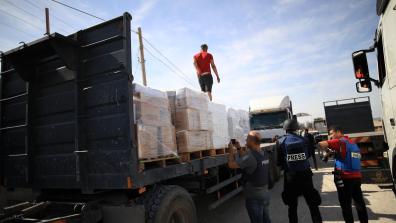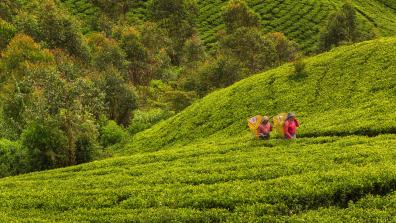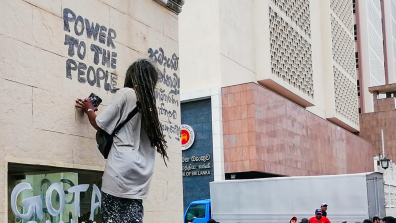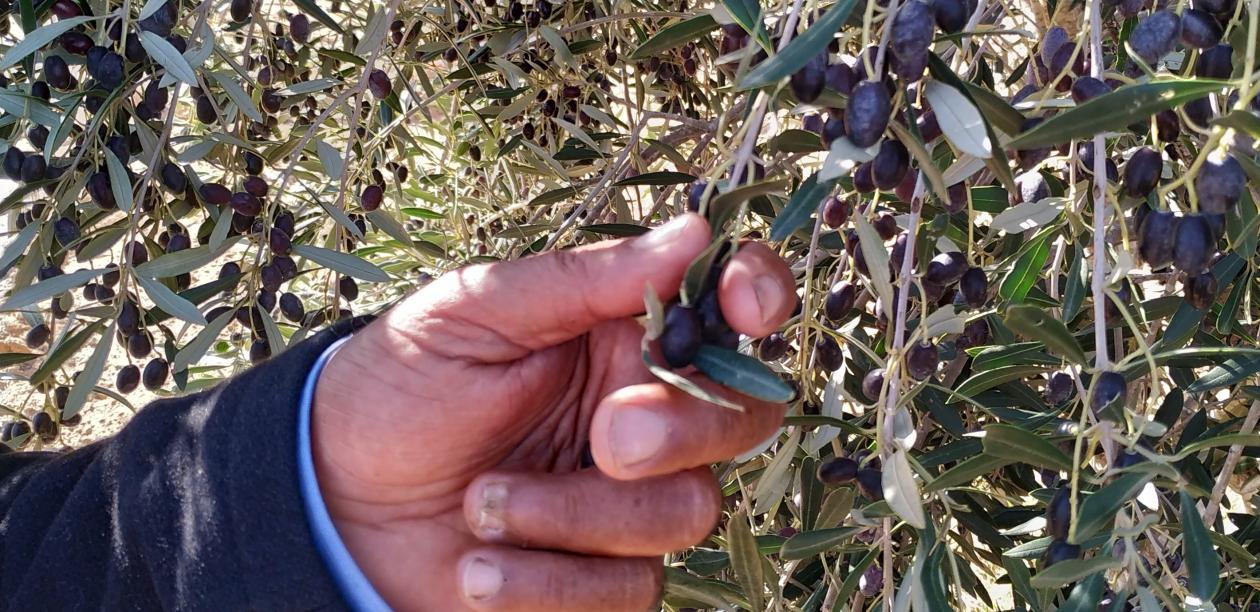Why the global farmers’ protests matter
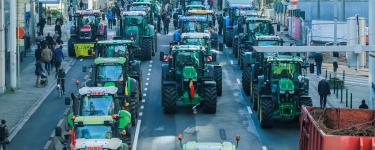
Echoing events that took place in 2023, farmers are mobilising against agricultural and economic policies which are endangering their livelihoods. National demonstrations have spread to over 65 countries, with farmers protesting against low prices for their crops, the high cost of agricultural fertilisers, unrealistic environmental regulations, unfair trade deals, and government policies favouring corporations over farmers.1
Why do the protests matter for all of us?
Food is not just another item in national budgets or a commodity to be traded in financial markets: it is a fundamental human right, which is closely connected to people’s culture, health, and geography.
Food is easily weaponised during wars and acts of genocide, as Israel's plausible genocide in Gaza shows us – Israel is using starvation as a weapon of war against the Palestinian people9 . Eating and preparing food is about more than just consumption; these are political acts connected to our food systems, and who controls or benefits from these food systems – and who loses out. Therefore, every time we put food on our table, we engage in a political act.
What's happening?
In India, farmers are once again taking to the streets following demonstrations that took place in the country four years ago.2 Throughout February 2024, marches were held in Delhi, Punjab, and Haryana to highlight the absence of legal guarantees for a minimum support price (MSP) for farmers’ crops – a crucial agricultural policy safeguarding farmers' livelihoods. ( The Indian government sets a minimum price, or MSP, for certain agricultural products where market prices are less than the costs incurred by farmers.)
In Argentina, protests by smallholder farmers have also gained momentum. Here, farmers are bringing attention to a lack of access to land and unfair pricing, made worse by a severe drought that damaged crops in 2023. Farmers are also protesting the lack of governmental support and public funding for agroecology (sustainable farming that works with nature). Argentina’s recent dengue fever outbreak has highlighted the need for agroecological farming, with the outbreak linked in part to damaging industrial agriculture practices, such as the use of agrochemicals, which kill off predators of the dengue mosquito, fish and amphibians.3
The election of Milei’s right-wing government in Argentina has made the situation worse. By dismantling crucial institutions such as the National Institute for Family Farming in the name of ‘cost-cutting’, Milei's government has left smallholder farmers with less protections, whilst keeping policies which benefit large commodity traders (such as Cargills, Dreyfus), biotech corporations (Monsanto, Syngenta) and agricultural 'oligarchies' – landowners of large plantations (latifundios).
In the first three months of 2024, food prices have sky-rocketed by over 60%, whilst the Argentinian government has reverted to ‘free-market’ thinking by once again allowing the import of cheap basic food items from abroad, further exacerbating the challenges faced by local farmers.
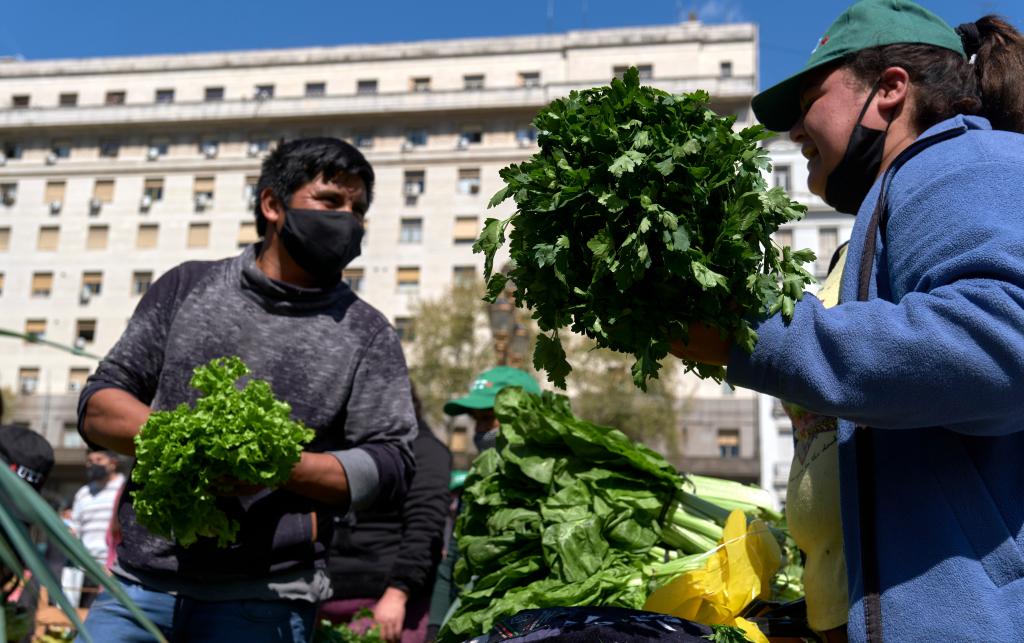
Protests in Europe
Meanwhile, mass protests by farmers have been happening across Europe, including in Belgium, France, Germany, Italy, Poland, and Spain. Whilst the specific grievances vary from country to country, shaped by various farming unions and movements, a common feeling of distress prevails. In Poland, protests have centred around unfair competition from Ukrainian goods flooding the market after the EU scrapped tariffs on Ukrainian imports in 2022, undercutting local farmers. In Germany, issues include the ban on diesel tractors.
More broadly across countries, European farmers have voiced opposition to new so-called ‘green’ environmental regulations outlined in the EU Green Deal ‘Farm to Fork’ strategy. While on the surface these 'green' regulations appear commendable – by transitioning away from intensive farming practices and chemical pesticides – in reality they do little to support smallholder farmers during this transition, whilst the EU continues to pursue ‘free trade’ deals (which cut agricultural regulations and lower the prices farmers can get for their produce), and while agricultural land is concentrated into the hands of just a few large agribusiness corporations.
Coverage of the protests in European media has attempted to stir up controversy, often portraying farmers as conservative right-wingers opposed to ecological transitions and neglecting the more complex reality of the situation.
Larger farmers’ movements are pushing back against the new EU ‘green’ environmental regulations, arguing the regulations would drive up costs and impose heavy regulatory burdens. The farmers' movements are finding support from influential lobbying networks such as COPA-COGECA, two major farming lobbying groups in Europe (which smaller farmers accuse of prioritising the interests of industrial agriculture), and a number of food and agribusiness corporate lobby groups within EU institutions.4
Since the 1980s, various regulations ensuring fair prices for European farmers have been scrapped, with the EU banking on ‘free trade’ agreements that prompt farmers to produce crops at the lowest cost, often at the expense of their own incomes. These 'free trade' agreements, such as the ongoing negotiations between the EU and the Southern Common Market (or 'Mercosur'), including Brazil, Argentina, Paraguay, and Uruguay, pose challenges for smallholder farmers in both the North and the Global South.5
The grassroots farmers’ movements, such as those organised under the European Coordination of La Via Campesina (ECVC), are focusing their protests and action against the Common Agricultural Policy (CAP), a system of agricultural subsidies and programmes covering farming, environmental measures and rural development. Grassroots farmers argue that the EU's adoption of these World Trade Organisation-promoted policies and trade deals, which favour big agribusiness and foster destructive international competition, has directly worsened their situation.
How has the European Commission reacted to all this? The EU has bowed to pressure from large farmers and agribusinesses by backtracking on initial proposals to halve pesticide use by 2030. Nothing significant has been done to support small and medium farmers in the short term, or to tackle pressing structural issues with a long-term vision for a just transition. In fact, some EU member countries have scaled back environmental efforts: France halted its pesticide reduction plan, and Germany abandoned its plan to stop tax breaks for farming vehicles and subsidies for off-road diesel fuel.6
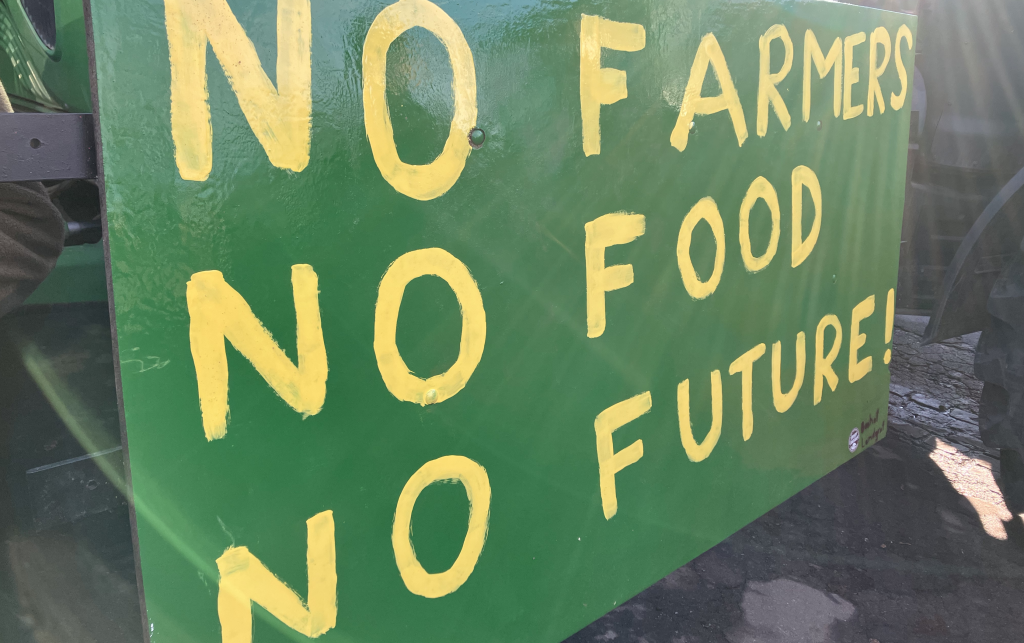
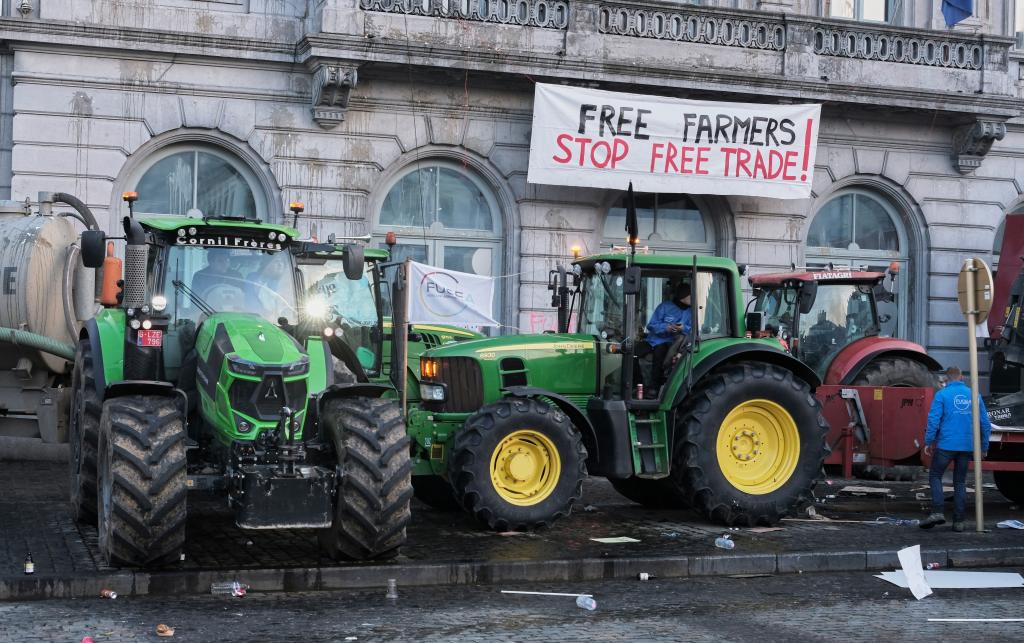
The same old neoliberal recipes
The farmers' protests across the world must be understood in the context of decades of neoliberal policies: the deregulation of markets (and speculation in financial markets), privatisation, and oligopolies (a market controlled by few large corporations), which have significantly influenced the agricultural policies and the industrial agrifood system that permeates our society: from the rural landscapes to the supermarket shelves.
In the Global South, decades of deregulation and trade rules imposed by the World Trade Organisation, the World Bank and the International Monetary Fund, along with multilateral and bilateral ‘free trade’ agreements, have often left countries facing chronic food shortages. This means that Global South countries are forced to import crops instead of prioritising domestic food production, undermining their food sovereignty. For instance, African nations today import more food than they produce and export. This is expected to escalate, with imports projected to soar from $35 billion in 2015 to an estimated $110 billion in 2025.7
Meanwhile, in the Global North, policies like the EU Common Agricultural Policy (CAP) have driven many smallholder farmers off their land, leading to land concentrated in the hands of a few corporations. These corporations often adopt production practices with lower environmental standards, doing harm to local biodiversity, animal welfare, and workers’ rights, all in pursuit of higher profits.
Such policies, characterised by unfair competition, price volatility, and industrialised farming practices, have consistently favoured large agribusinesses and market concentration. In the EU, for example, most of the annual 400-billion-euro CAP funding flows to large intensive farming operations8 , putting small-scale farmers who often employ some form of sustainable methods (from agroecological practices to certified organic production) at a disadvantage. Many farmers find themselves grappling with the consequences of this neoliberal paradigm, which prioritises economic gains over people and the environment. Similar concerns are echoed in the UK, where many medium-scale farmers fear that new environmental farming subsidy schemes, which prioritise rewilding (in a context where food imports are already larger than local food production), could significantly cut their income and potentially force them out of business.
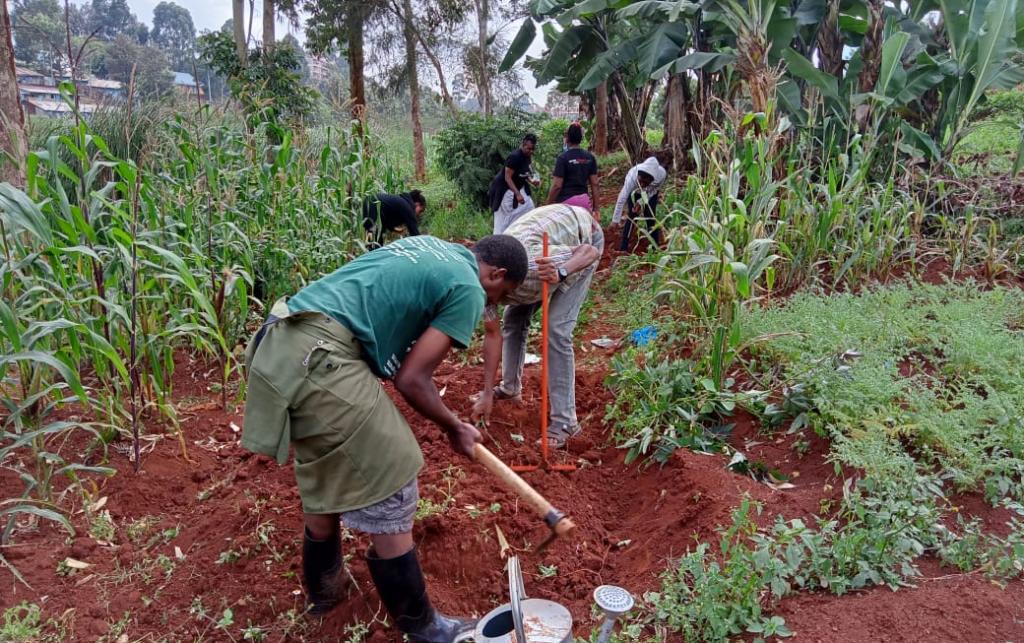
Food as a human right
Food is not just another item in national budgets or a commodity to be traded in financial markets: it is a fundamental human right, which is also closely connected to people’s culture, health, and geographies.
There is generally a large disconnection between those who grow our food and those who eat it, especially if consumers are from large urban areas. This is especially true in the UK, where urban living and serious land inequality has pushed many away from rural life and their ties to food production. More than half of the food in the UK comes from abroad10 , making the country heavily reliant on supermarket chains and the work of farmers and agricultural workers from Europe and beyond, including countries like Morocco11 .
A just transition in our food system is urgently needed, but it can’t be achieved without the agreement of those who put the food on our tables.
The global farmers’ protests signify a powerful demand for systemic change, requiring a reconnection between food, farmers and the rest of the population. We need a just transition in the food system, both locally and globally. However, this should not simply come from farmers, neither can we rely on the system to correct itself.
Therefore, the question remains: at whose expense will this transformation happen? As shown by the EU’s attempts to move European agriculture in a more sustainable direction – these reforms have encountered obstacles that are part of the same neoliberal model that they are trying to promote.
This situation resembles a dog chasing its own tail: the very system requiring significant sacrifices from farmers for an ecological transition is the same one that has fuelled inequalities and environmental harm in the food systems.
This transition has to come from large public funding and not from the farmers who, for more than 50 years, have been asked across the world to produce cheaply – with severe consequences for people’s health, the environment and the climate. Today, farmers are being asked again to produce cheaply - with additional pressure coming from the purchasing power of supermarkets12 - and ecologically, and this is simply not possible.
Only by prioritising food sovereignty, where farmers, food and farm workers play an active role, we can make sure that a just transition happens.
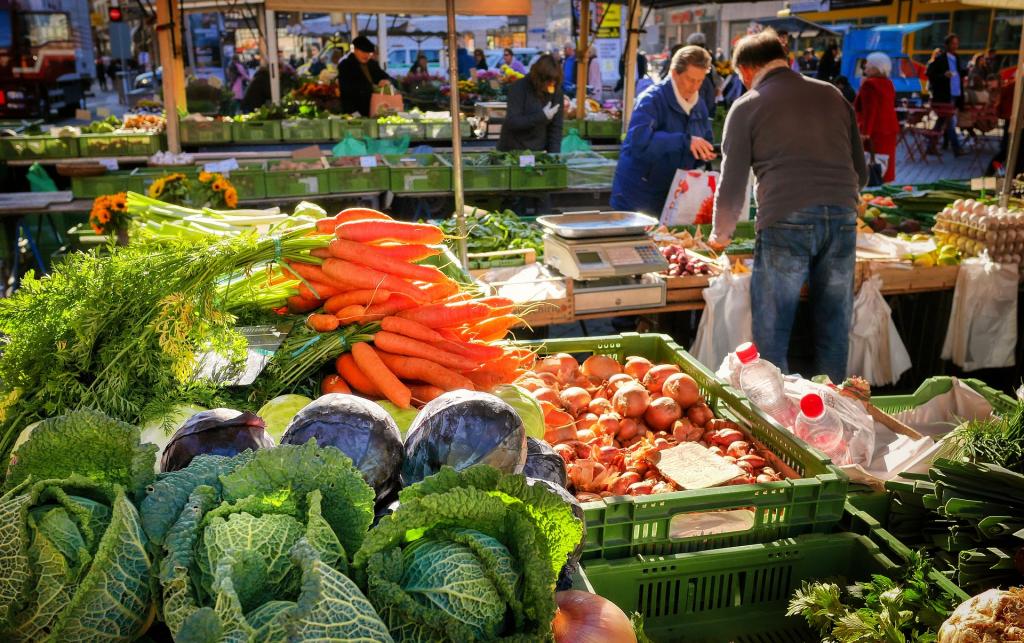
What does this mean in practical terms?
It means, among other things:
- Removing subsidies and tax cuts to large ‘BigAg’ and fossil fuel corporations. As stated by La Via Campesina, “corporations progressively taking control of food systems only appear ‘competitive’ because they are heavily subsidised with public money and are not required to bear the health, environmental, and social costs of their industrial production model”.
- Providing financial support for peasant agroecology, while allowing enough time for transition.
- Creating public policies for food sovereignty, which includes government regulation of markets to prevent the concentration of food systems in large corporations and their speculation on food prices.
- Opposing trade agreements that harm peasants in both the Global North and South, and promoting shorter, more localised food supply chains.
- Implementing land distribution and agrarian reform to ensure the right to land.
- Investing in appropriate agriculture technologies13 (where applicable) which rely less on fossil fuel-dependent production techniques.
- Rejecting false solutions like carbon markets and agro-fuels, which often lead to land grabs and the displacement of peasants, Indigenous and rural communities around the globe14 .
And above all, it means prioritising the implementation of human rights in national policies and programmes, such as the UN Declaration on the Rights of Peasants and Other People Working in Rural Areas (UNDROP). Given the interconnected nature of the climate crisis with global inequality, hunger, poverty, migrations, dispossession, territorial conflicts, political repression, occupations and increased militarisation and wars, broad systemic changes are urgently needed. These changes must also prioritise the socio-economic rights of food producers across the world.
In the UK, grassroots farmers' organisations such as the Landworkers Alliance have launched an important Manifesto15 , outlining strategic demands and policy priorities for a food sovereignty approach ahead of the next general election. They have also started a petition for everyone to sign.
A food sovereignty model is the only way inequality and poverty can be addressed, taking into account historical injustices and exploitative systems prevalent in global food production. It is also the best way to ensure food production and distribution thrives within planetary boundaries.
Demand action to secure global food sovereignty
As active citizens and part of the broader movement for justice, we can all contribute to building the food sovereignty movement.
Take action- 1//www.downtoearth.org.in/news/agriculture/farmers-in-at-least-65-countries-rose-up-in-protest-since-january-2023-here-s-why-94431
- 9https://www.ft.com/content/93b5c4b5-a94f-4796-b5fb-6f56757828ff and https://www.bbc.co.uk/news/science-environment-68655661
- 2https://waronwant.org/news-analysis/what-indian-farmers-protest-can-teach-us-all
- 3//waronwant.org/profiting-hunger/4-financial-sector-land-grabs/5-corporate-agriculture-and-right-health and https://agenciatierraviva.com.ar/dengue-cambio-climatico-y-monocultivo-tres-caras-de-un-mismo-problema/ (in Spanish only)
- 4https://www.desmog.com/2023/10/18/mapped-the-deep-ties-between-big-ag-and-europes-right-wing-politicians/
- 5//viacampesina.org/en/eu-mercosur-trade-deal-a-threat-to-peasant-rights-and-nature/
- 6https://www.bbc.co.uk/news/world-europe-68218907
- 7//justtransitionafrica.org/wp-content/uploads/2023/05/Just-Transition-Africa-report-ENG_single-pages.pdf
- 8//www.arc2020.eu/cap-the-commission-and-livestock-supports-money-matters/
- 10//waronwant.org/profiting-hunger/10-food-and-agricultural-workers-uk-organising-against-exploitation
- 11https://waronwant.org/profiting-hunger/9-moroccan-workers-organising-against-exploitation-mega-farms
- 12//www.sustainweb.org/reports/dec22-unpicking-food-prices/
- 13 Appropriate technologies in agriculture are technologies that take into account the geographical, cultural, and socio-economic context where these technologies are implemented. Often, they are chosen by farmers and not imposed, they are small-scale, affordable, autonomous and more energy efficient. They are also considered by many farmers movements as an alternative to more expensive and fossil fuel-based chemicals and technologies.
- 14https://waronwant.org/profiting-hunger/3-corporate-capture-agriculture#falsesolutions
- 15https://landworkersalliance.org.uk/wp-content/uploads/2018/10/LWA-Manifesto-2023-Digital-.pdf
